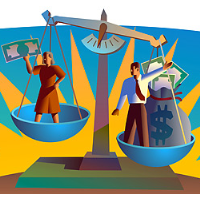Women Are Not Sharing in State’s Economic “Recovery”

After four years of post-recession stagnation, the economic recovery in California, such as it is, has benefited men more than women, according to a study by the California Budget Project.
Employment has edged up 1.7% to 81.1% for men 25 to 54 the past two years, while women have seen a 0.8% decline to 64.5%. Women make up more than two-thirds of the 300,000 drop in community college enrollment since 2007-08 and have seen their options limited by steep reductions in state support of child care and preschool.
Women have been hurt the most by a continued decline in public-sector jobs, especially in public schools, where more than seven out of 10 workers are female. And the worst may be yet to come as sequestration kicks in and the federal government makes across-the-board budget cuts in all levels of government and the economy.
The report, “A Fair Chance: Why California Should Invest in Economic Opportunity for Women and Their Families,” noted that low-income women and their children felt the ramifications of the new economy the most. The study funded by the Women’s Foundation of California.
The median income for California women dropped from $32,973 in 2006 to $30,938 in 2011. The California Work Opportunity and Responsibility to Kids (CalWORKs) program, a key part of the state’s safety net that disproportionately benefits low-income women and children, has been reduced 12% since 2008. That translates into a loss of $85 a month for a family of three.
The program’s cost-of-living adjustment was eliminated in 2010 and other program cuts have deprived families of the benefits well before their incomes reach the federal poverty line. Other programs where the majority of participant are women have also been cut, including the In-Home Supportive Services Program which helps 400,000 low-income seniors and people with disabilities remain in their homes.
The economic shift also portends bad things for the future. As women find themselves earning less and spending more time outside the work force, they set themselves up for reduced Social Security benefits in old age. Women, who tend to live longer than men, will have more time to contemplate the unfairness of the system.
–Ken Broder
To Learn More:
Women Not Getting Full Share of Economic Recovery, Jobs (by Kathy Robertson, Sacramento Business Journal)
New CBP Report: Investing in Women’s Career Advancement and Economic Security (The California Budget Project)
A Fair Chance: Why California Should Invest in Economic Opportunity for Women and Their Families (The California Budget Project) (pdf)
- Top Stories
- Controversies
- Where is the Money Going?
- California and the Nation
- Appointments and Resignations
- Unusual News
- Latest News
- California Forbids U.S. Immigration Agents from Pretending to be Police
- California Lawmakers Urged to Strip “Self-Dealing” Tax Board of Its Duties
- Big Oil’s Grip on California
- Santa Cruz Police See Homeland Security Betrayal in Use of Gang Roundup as Cover for Immigration Raid
- Oil Companies Face Deadline to Stop Polluting California Groundwater




